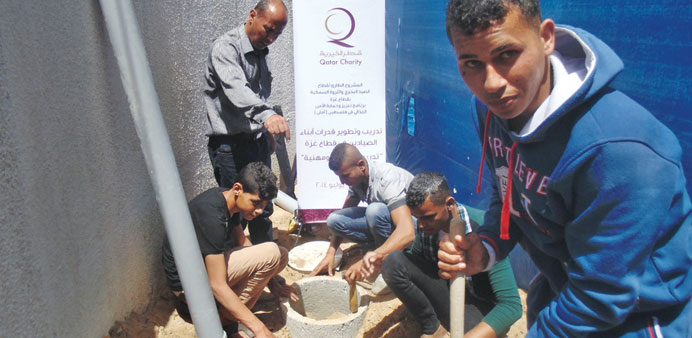|
Qatar Charity has concluded a training programme for the children of fishermen in the Gaza Strip. |
The training targeted 280 people at a total cost of QR500,000. The programme was part of projects carried out by QC in order to support the fishing industry and fisheries in the Gaza Strip with funding from the Ministry of Foreign Affairs, valued at QR37mn.
QC will also carry out income generating projects for trainees, who excel during the training programme.
The ceremony was attended by Dr Saleh al-Bakhit, Deputy Minister of Agriculture, Mohamed Abu Haloub, Deputy Director of the QC Gaza Office, other ministry officials in addition to the trainees in the Gaza Strip.
Al-Bakhit welcomed the attendees and thanked them for their efforts. He also thanked the institutions and individuals who contributed to the success of the project.
“The implementation of vocational training programmes comes in application of the proverb, do not give me a fish, but teach me how to fish,” Abu Haloub said. He added that the training would contribute to improving the living conditions of Palestinians and help them find different sources of income.
Abu Haloub added that the training was part of the emergency fishing sector project, which QC started three years ago in collaboration with the Ministry of Agriculture and the General Syndicate of Fishermen.
“The project will reflect positively on the ability of fishermen to live with dignity,” Bakhit said, praising QC’s leading role in projects in the Gaza Strip.
The concluding ceremony included the screening of a documentary, an exhibition about the project and distribution of certificates among the participants.
The project developed the capacity of 278 people through 13 training courses in a variety of areas, including a course on the maintenance of marine engines; it aimed to provide people with the skills necessary for the maintenance and repair of marine engines, the auxiliary marine systems, troubleshooting the manual and electric and operating system, conducting the necessary maintenance, and the ability to recognise engine parts and functions.
A sewing and embroidery training course was also conducted, preparing trainees to work in the sewing industry.
Also, an electrical general wiring course was conducted to enable participants to master general electric wiring works, including how to use hand tools and wire forming, the use of testing and measurement equipments, the assembly operation and troubleshooting faults in lighting circuits, electrical plugs and automatic lighting malfunctions.

